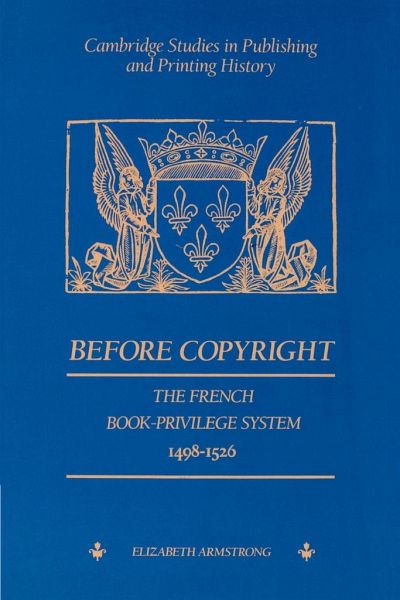
Before Copyright
The French Book-Privilege System 1498 1526
Herausgeber: Belanger, Terry; Mckitterick, David
Versandkostenfrei!
Versandfertig in 1-2 Wochen
49,99 €
inkl. MwSt.

PAYBACK Punkte
25 °P sammeln!
When printing first began, a new book automatically fell into the public domain upon publication. Only a special law or privilegium enacted by a competent authority could protect it from being reprinted without the consent of the author or publisher. Such privileges for books are attested before 1480, but in Germany and Italy their efficacy was limited to a relatively small area by the political fragmentation of the country. During the 1480s and 1490s France became one of Europe's main centres of book production and, as competition intensified, privileges were sought there from 1498. Although ...
When printing first began, a new book automatically fell into the public domain upon publication. Only a special law or privilegium enacted by a competent authority could protect it from being reprinted without the consent of the author or publisher. Such privileges for books are attested before 1480, but in Germany and Italy their efficacy was limited to a relatively small area by the political fragmentation of the country. During the 1480s and 1490s France became one of Europe's main centres of book production and, as competition intensified, privileges were sought there from 1498. Although privileges were to last as long as the Ancien Régime, the period to 1526 is the least-known stage of their development and the most important. Most privilege-holders printed the full text of their grant, and many others a summary.
Table of contents:
List of illustrations; Preface; Acknowledgements; note on transcription; Note on proper names; Sigla and abbreviations; 1. Origins and development of book-privileges in Europe; 2. Privilege-granting authorities in France; 3. Seeking and granting privileges: forms, conditions and procedures; 4. Grounds for seeking and granting privileges; 5. Grant of privilege and permission to print; 6. Dating and duration of privileges; 7. Display and advertisement of privileges; 8. The range of interests reflected in privileged books: analysis by subject; 9. Ownership, enforcement and efficacy of privileges; Conclusion; Select bibliography; Index of publishers, printers and booksellers; General index.
When printing first began, a new book automatically fell into the public domain upon publication. Only a special law or privilegium enacted by a competent authority could protect it from being reprinted without the consent of the author or publisher.
Table of contents:
List of illustrations; Preface; Acknowledgements; note on transcription; Note on proper names; Sigla and abbreviations; 1. Origins and development of book-privileges in Europe; 2. Privilege-granting authorities in France; 3. Seeking and granting privileges: forms, conditions and procedures; 4. Grounds for seeking and granting privileges; 5. Grant of privilege and permission to print; 6. Dating and duration of privileges; 7. Display and advertisement of privileges; 8. The range of interests reflected in privileged books: analysis by subject; 9. Ownership, enforcement and efficacy of privileges; Conclusion; Select bibliography; Index of publishers, printers and booksellers; General index.
When printing first began, a new book automatically fell into the public domain upon publication. Only a special law or privilegium enacted by a competent authority could protect it from being reprinted without the consent of the author or publisher.




